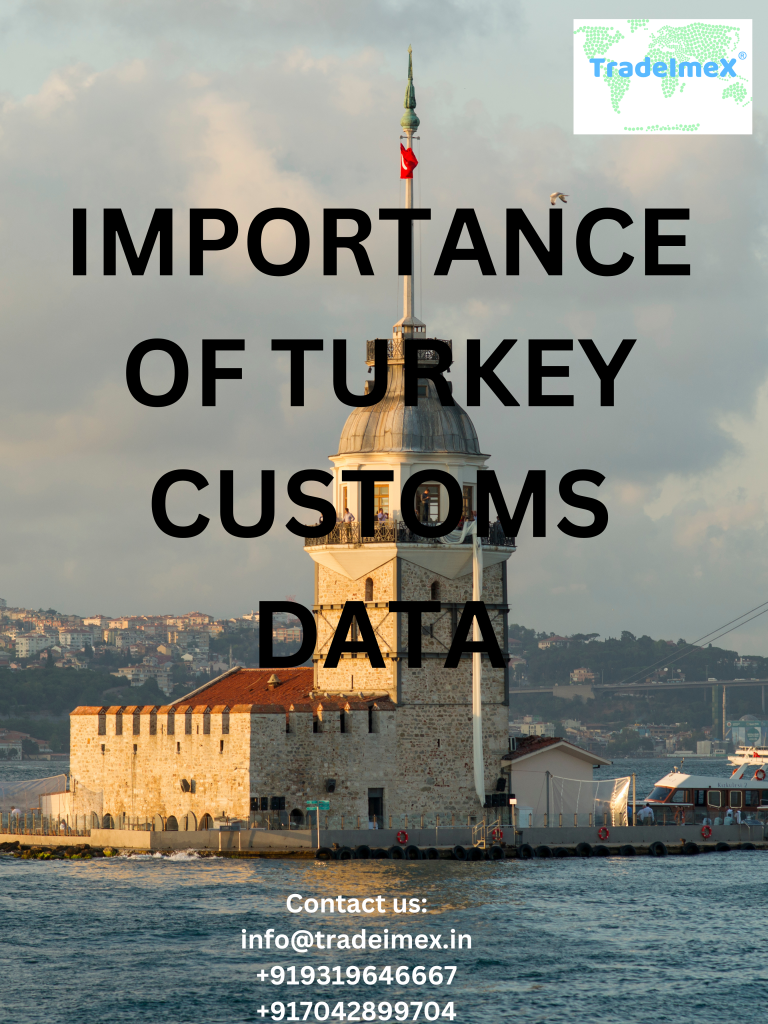
BRIEF OVERVIEW
In today’s globalized world, businesses rely on a wealth of information to make informed decisions and stay competitive. One invaluable source of data for companies involved in international trade is customs data. Customs data provides essential insights into the movement of goods across borders, and in the case of Turkey, it plays a pivotal role in facilitating trade, ensuring compliance, and driving economic growth. In this article, we will explore the significance of Turkey customs data and how it can benefit businesses and policymakers alike.
FACILITATING TRADE
Turkey, decisively situated at the junction of Europe and Asia, fills in as a critical extension between these main lands. Its geological position has made it a center point for global trade, drawing in organizations from everywhere in the world. Turkey’s customs information is a treasure of data for merchants, exporters, and operations organizations. It offers an wide perspective on exchange exercises, including the volume and worth of imports and products, the nations in question, and the wares exchanged.
This data is instrumental in streamlining the logistics and supply chain management of businesses. It helps companies identify potential trade partners, optimize shipping routes, and forecast demand. By understanding the trends and patterns in Turkey’s imports and exports, businesses can make strategic decisions that save time and reduce costs.
ENSURING REGULATORY COMPLIANCE
International trade is subject to a labyrinth of regulations and compliance requirements. Navigating these complex regulations is a daunting task for businesses, and non-compliance can lead to severe penalties. Turkey Shipment Data serves as a valuable compliance tool by providing insights into the rules and regulations governing trade.
Customs information assists organizations with guaranteeing that they are complying with all import and product guidelines, including levies, amounts, and authorizing prerequisites. It additionally gives data on customs obligations and expenses, assisting businesses with precisely working out their expenses and plan their financial plans in like manner. By remaining compliant, organizations can stay away from expensive legitimate difficulties and keep up with their standing in the worldwide market.
ASSESSING MARKET OPPORTUNITIES
For businesses looking to expand their operations into Turkey or explore new markets, customs data offers a goldmine of information. It provides a detailed breakdown of the types of products that are in demand, the countries that are trading with Turkey, and the prevailing market conditions.
By dissecting Turkey customs data, organizations can recognize arising patterns and market specialties. They can acquire bits of knowledge into buyer inclinations and come to informed conclusions about item improvement and advertising techniques. This information driven approach upgrades an organization’s odds of coming out on top while entering the Turkish market or extending its presence there.
MONITORING COMPETITORS
In the fast-paced world of international trade, staying ahead of the competition is vital. Turkey trade datasets allows businesses to keep a close eye on their competitors. By tracking the import and export activities of rival companies, businesses can gain valuable intelligence on their strategies, pricing, and market positioning.
This competitive intelligence can be used to fine-tune a company’s own strategies, such as pricing products more competitively, identifying untapped markets, or differentiating products and services. By leveraging customs data, businesses can gain a strategic advantage and better position themselves in the global marketplace.
SUPPORTING POLICY AND DECISION-MAKING
Customs data or Turkey Import Data report is not only beneficial for businesses but also plays a crucial role in shaping government policies and decisions. Governments rely on this data to assess the impact of trade policies, monitor trade balances, and formulate strategies to promote economic growth.
By analyzing customs data, policymakers can identify sectors that require support, evaluate the effectiveness of trade agreements, and make informed decisions regarding tariffs and trade restrictions. Additionally, customs data assists in trade negotiations by providing information that can be used as a basis for discussions and agreements with other nations.
CONCLUSION
In a world where information is power, Turkey datasets stands as a potent tool for businesses and policymakers alike. It facilitates trade, ensures regulatory compliance, assesses market opportunities, monitors competitors, and supports informed decision-making. Whether you are an importer, exporter, logistics provider, or government official, customs data is an invaluable resource that can help you navigate the complex world of international trade.
As businesses continue to expand their global footprint, the importance of customs data will only grow. Access to accurate and up-to-date customs data will enable companies to adapt to changing market conditions, seize new opportunities, and remain competitive in the global marketplace. In a nutshell, Turkey customs information is the key to unlocking business potential and driving economic growth in an interconnected world. To get more and deep information about the same, you just have to contact TradeImeX today and start your trading journey with a punch.
Source URL: https://www.atoallinks.com/2023/what-is-the-importance-of-turkey-customs-data/
Leave a comment